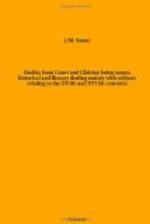On the 12th October 1584, the provincial, Father Bader, ordered that the servants of this Father should not come and go, and run in and out, as he and they pleased. If he required anything in the night, the other Fathers should be ready to assist him charitably and patiently.
But there were still other difficulties at Hall, in connection with the quasi-religious community, such as St. Francis Borgia had predicted, and these rose to such a pitch, that in 1596, Father Hoffaus expressed his opinion to the General, that it would be better to give up their college there, and so once for all get rid of the burden imposed on the Society by “Queen Magdalen.”
The whole trend of this correspondence shows the tremendous obstacles which the Jesuits encountered, not merely at Innsbruck but throughout Austria and Bavaria, in their efforts to abstain from all that was alien to their vocation. It is curious in these days to note how much the old Society suffered from a superabundance of favour on the part of princes. And far from being stereotyped reproductions of one unvarying pattern or spiritual automata turned out of one mould, the Jesuits, as represented in their own private correspondence, which was never intended for the public eye, reveal a considerable amount of individuality. The interpretation of the rule was elastic enough to give scope to much diversity of opinion, and if superiors were jealous guardians of the Institute, they encountered sufficient idiosyncrasy among their subjects to prevent any rigidity in applying it.
It seems more than likely that if Lacordaire had had his wish, and had been able to dedicate ten years of his life to the study of the Jesuit character, he would have found on the whole that he had, after all, set himself the very ordinary task of watching a perpetual conflict between a high ideal and that frailty which is inseparable from human nature.
VI. GIORDANO BRUNO IN ENGLAND
The revolt from Scholasticism in the sixteenth century, led by Erasmus of Rotterdam, John Colet, and other apostles of the new learning, reached farther, and was productive of other results than these had intended or anticipated.
Erasmus was called an infidel by the friars, but he always stoutly protested his adherence to the Church of which the Pope was the head; and Colet has been considered by many as a herald of the Reformation, although he died a Catholic. Erasmus, by his own showing, was no infidel, and there are sufficient indications that Colet, even had his life been prolonged, would never have gone over to the enemy; but both had given cause for apprehension by opening doors to a profound dissatisfaction, to novel theories and extravagant systems, which many friends of Erasmus carried on to a denial of all revealed religion.
In throwing discredit on the schoolmen, Erasmus had prepared the way for a contempt of Aristotle himself, and when the ex-friar Giordano Bruno of Nola appeared as a leader of revolt, distinct from Luther and Calvin, he found in Italy and France a small band of intellectual revolutionists clamouring for a philosophy that should emancipate them from the thraldrom of Christianity, and yet save them from the dishonourable name of atheists.




